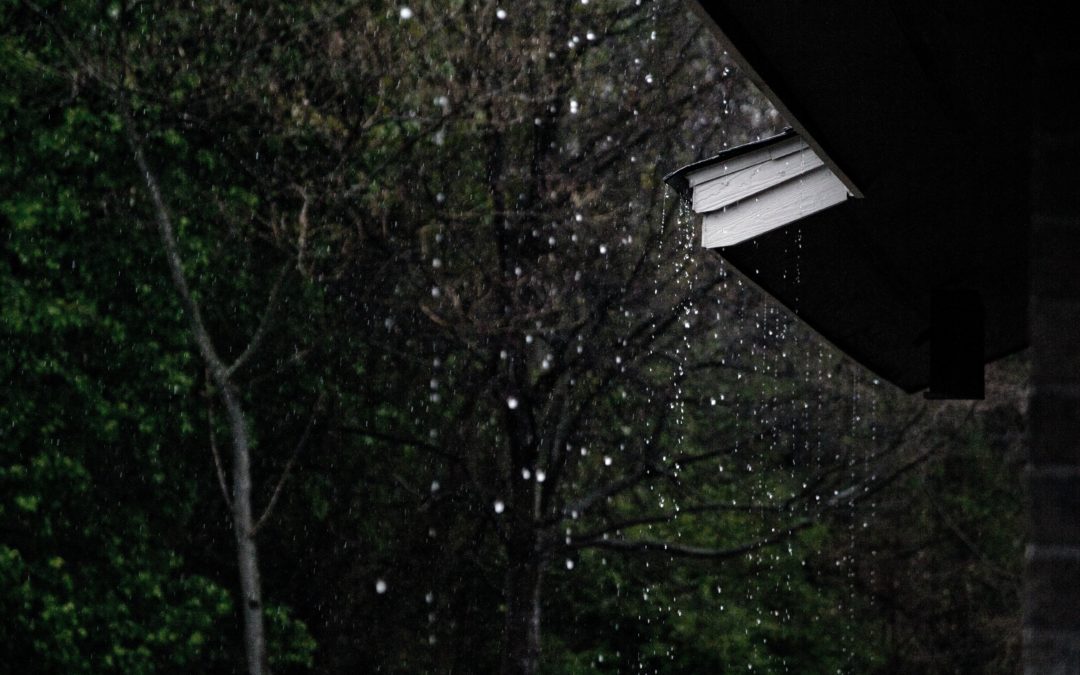None of us can predict the weather with 100% accuracy. Especially here in the Midwest, conditions can change quickly. If the forecast calls for rain on the day your roof is to be installed, or showers pop up out of nowhere, what happens with your roof? Can roofers still install a roof in the rain? The quick answer is no, and we’ll explain why.
Your roof is there to protect your home from moisture, wind, and rain. During the roof installation, delicate parts of your home are exposed to the elements, parts that are never meant to deal with moisture, from either a driving rain or even high humidity. When your roof is being installed, it’s important that it happens in as dry of conditions as possible, as any moisture present during installation could cause damage and compromise your roof.
Why Roofers Won’t Install a Roof in the Rain
What happens if there’s inclement weather on the day that your roof is supposed to be installed? Sometimes rain is unavoidable, and it doesn’t always work with our schedules. Despite the inconvenience rain can bring, roofers won’t install a roof in the rain. The presence of weather and water during a roof install threatens the integrity of your new roof and puts your home and your roofing crew at risk.
Installing a Roof in the Rain Puts Your Home at Risk
During a roofing installation, your roofing deck is exposed to the elements. A wet roofing deck can grow mold and mildew which could cause the wood to change shape or rot, leading to failure of your new roof. Droplets from rain, condensation, dew, or even high humidity could all cause roofing materials to swell or wrinkle, leading to buckled, rippled or misshapen roofs. Shingles also may not adhere correctly or evenly if the materials underneath them are damp or slick.
Defects in the installation that lead to roof failure fall on the shoulders of your roofing installer, who might be liable for damage as a result of improper installation. Roofers know this and won’t install a roof in the rain because they can’t guarantee good quality workmanship in wet conditions.
Installing a Roof in the Rain Puts Roofers at Risk
Another important reason your roofer won’t install a roof in the rain is that it puts their crew at risk. Even when following correct safety procedures, a slick roof can lead to serious injuries. Someone could slip and fall, causing damage to themselves and your exposed roof. Or, if there’s lightning in the area, your roofing installation crew might be the tallest objects around. It’s not worth the risk of an accident to install a roof in the rain, whether it’s a cloudburst or just a drizzle.
If your roofer does not carry the proper insurance, liability for any injuries incurred on your property could fall to you. To avoid this, make sure your roofer follows all proper safety protocols, including wearing appropriate fall protection as defined by OSHA, and that they and their crew are covered by General Liability Insurance.
What Happens if it Starts to Rain?
If a few drops start to fall or a sudden shower pops up, your roofers should be prepared. They will have materials to cover any exposed parts of your roof as quickly as possible to protect it from damage. Oriented strand board (OSB) is made of layers that contain wax or resin, and the edges are treated to be resistant to moisture, so a few drops are not likely to cause any lasting damage. Still, if the wood gets wet, it will need to be allowed to dry completely before work can continue. This is because wood swells when it absorbs moisture, and any materials attached to the deck could trap that moisture in.
Roofing contractors know not to install a roof in wet conditions. They won’t continue to install a roof in the rain, but will wait until the site is dry and safe for your roof and your roofing installation crew.
Be Prepared and Be Flexible
To avoid any problems, try to schedule your roof install for a dry weather day, but have a backup plan in place with your roofer. When the day arrives, keep an open mind and your eye on the sky. If rain clouds start to form, it’s best to postpone the rest of the project until it can be completed safely. A little flexibility is worth getting a great quality roof you trust. You and your roofer will feel confident that the job will be done right and your new roof will last you a long time.
Working with the Right Roofing Contractor
It’s important to hire the right roofing contractor that understands the dangers of rain and moisture when installing a roof. The right roofing contractor will be qualified and certified for the products they’re installing and know what conditions will give you the best quality, longest lasting roof. They will make decisions that will put your priorities first and have a plan for what to do if weather conditions suddenly change to avoid the dangers of installing a roof in the rain.
The right roofing contractor will also be insured, so if any problems occur during installation, the homeowner won’t be liable. Make sure your roofer is covered by General Liability Insurance and Workman’s Compensation Insurance so you won’t be liable to cover costs or treatment for injured workers.
Worried about installing your roof in the rain? It’s a legitimate concern, but with a great roofer that puts your priorities first, you’ll still get that brand new roof, you might just have to wait until it stops raining. For all your roofing needs, reach out to Werner Roofing!
FREE ROOF INSPECTION & QUOTE
If you’re considering a new roof, the first step is to have us come out for a FREE inspection. This will allow us to evaluate your roof and give an honest estimate based on your roof’s current condition.
ASK A ROOFING QUESTION
Do you have a roofing question? We’re here to help. Just let us know what you’re wondering about, and one of our representatives will get back with you shortly.


